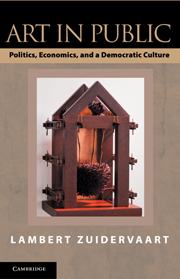7 - Relational Autonomy
Published online by Cambridge University Press: 05 June 2012
Summary
A kind of transcendence is preserved…in the negativity of modern art. The trivial and everyday must be open to the shock of what is absolutely strange, cryptic, or uncanny.
Jürgen HabermasThe discussion of art’s role in civil society has shown why public debates about government arts funding often shed more heat than light. The debates presuppose an opposition between market and state that overlooks both the distinctiveness of civil society as a nonsystemic macrostructure and its interfaces with economic and political systems. The debates’ binary frame also fails to articulate either the systemic pressures that threaten civil society and the arts or the normative deficiencies that pervade society’s macrostructures. As a result, debates about government arts funding often divert our attention from how art in public could help challenge the forces of hypercommercialization and performance fetishism and normatively redirect contemporary society.
Yet these debates concern more than the contest over market and state, and there are additional reasons why they so frequently short-circuit. As was indicated in Chapter 1, the typical debate embodies a tension between promoting the freedom of artistic expression and maintaining the authority of traditional values. It also carries out a conflict between art as liberating transgression and art as a decadent menace. Built into such polarities are individualistic assumptions about artists and their publics and vanguardist assumptions about the role of the arts in society.
- Type
- Chapter
- Information
- Art in PublicPolitics, Economics, and a Democratic Culture, pp. 207 - 240Publisher: Cambridge University PressPrint publication year: 2010



